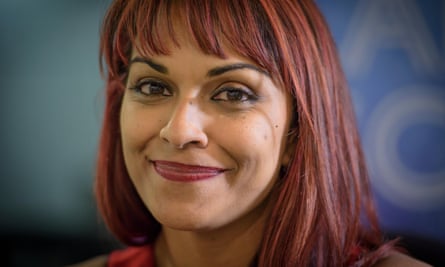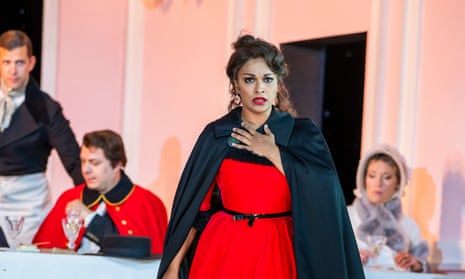The soprano Danielle de Niese’s opening performance in Puccini’s La Bohème at the Royal Opera House two weeks ago was acclaimed as “standout”, “show-stealing” and “big-hearted” as she “startle[d] with her energy and physicality, fusing acting and song in a way no one else approaches”.
What neither the critics, the audience nor most of her colleagues knew was that 18 hours earlier she was doubled up in hospital in searing pain from a miscarriage, and the cramps continued for days afterwards.
She has chosen to reveal her ordeal, telling the Guardian that women face the pain of miscarriages every day and that she was fortunate to have the Royal Opera House’s full support.
De Niese, 41, did not know she was pregnant. She is still breastfeeding her seven-month-old daughter, Sheherazade Christie, younger sister to her and her husband, Gus Christie’s son, Bacchus. But the day before her performance, she experienced cramping and went to see her doctor who confirmed she was pregnant.
“Even though I thought I was having a miscarriage, when Gus and I heard that I was pregnant there was no time to come to grips with it,” she said. The couple travelled home to Glyndebourne in East Sussex. “I was thinking: ‘I’ve had a miscarriage; this will probably come out in a few hours and I’ll then rest for the performance.’
“If I heard myself from the outside, I’d think: ‘Wow, why are you thinking about that, of all things?’ But it wasn’t that I was prioritising my performance over what I was going through; there was a part of me that really desired seeing my premiere through.”
The pain grew that night and the couple went to hospital in Brighton, where De Niese received liquid morphine. “I was in more pain than I could manage to hide from my children,” she said. The hospital was unable to scan her at the weekend to determine whether it was an ectopic pregnancy – one that develops outside of the womb, which affects one in 90 pregnancies in the UK – so she returned home.
By morning, De Niese was experiencing less pain, though her cramps continued. “I thought that if we’re not going to be able to establish if this is ectopic or not, and I’m not having the same pain levels, could I perhaps perform?”
De Niese, who won the Australian television competition Young Talent Time aged nine, made her opera debut at 15 and won an Emmy at 16, made her Royal Opera House debut in 2009. She has had her share of opening night adventures, from in-house protests to food poisoning.
She phoned the Royal Opera House. “They were so supportive,” she said. “If I wanted to pull out they reassured me they had contingency plans in place, but they didn’t make me. It’s conceivable that a theatre house could have thought about their own risk assessment and encouraged me not to go on.

“I felt so loved in that moment because as a theatre person you want to perform. If you feel that you can make it through, then you want to try. I suppose, if they had told me not to perform, I may have felt sidelined and even like I was being penalised for talking about it.” She was assured she could pull out at any point, including during the performance.
She spoke to medics to make sure that performing would not put her at additional risk. “I love theatre but I’m not a drama merchant and I’m not looking for chaos. People watching the performance won’t be transported away if someone collapses on stage,” she said. She gave her medical notes to her dresser but kept it from the performers because she did not want them to be distracted, and went on stage.
Playing the part of Musetta, she performs in acts two, three and four of the two-hour and 25-minute rendition of La Bohème. Her husband came backstage after act two. “I asked him: ‘How was that? It was like an out-of-body experience for me,’ and he told me it was amazing.
“He was looking at me in the way people do when they’re trying to reconcile two things that they both know to be true, as if he was trying to look inside me, to understand what was actually going on. It didn’t seem plausible, to him, that he saw the pain I was in and then I was able to perform the next night.”
When it came to the top notes, she could feel a strain on her groin muscles, she said, and at the end rather than jumping off the stage she was given a hand to get down – but the audience were unaware.
“Normally when I perform I’m hyper self-aware of what I’m projecting forward. I’m in the service of the storytelling aspect of my role. The part of me that knows that, knows how to do it so well that I was able to do it, in spite of having a medical experience.”
Her unknown pregnancy and subsequent miscarriage was confirmed as ectopic two days after the performance. Unlike some women, she has not had to undergo any operation or medical procedures.
Oliver Mears, the director of opera at the Royal Opera House, said: “We were incredibly sorry to hear of Danni and Gus’s experience, and have enormous sympathy for all that Danni has been through. At ROH, each artist has a cover for their role for any eventuality; on this occasion, Danni was offered cover but decided after medical advice to go on stage.
“We discussed at length and respected Danni’s decision to perform. We are proud of the support we provide all staff and artists – and proud also of Danni as an artist who gives her full self both on and off-stage: whether giving a magnificent performance in La Bohème in hugely difficult circumstances, or highlighting issues that matter to women everywhere. We wish Danni, Gus and the family all our best.”
An estimated one in four recognised pregnancies end in miscarriage, according to the miscarriage charity Tommy’s. De Niese said: “I’ve been through a major ordeal and am grateful I managed to triumph professionally, regardless of what was happening personally and physically with me, especially at this time when people are so thirsty for live music and live theatre after pandemic lockdowns.
“I was fortunate to have the amazing support of ROH. But this is something that women face every day and that determination and desire to continue, for ourselves and for others, is there within, despite female experiences from fertility treatment to miscarriage happening in the workplace.”
